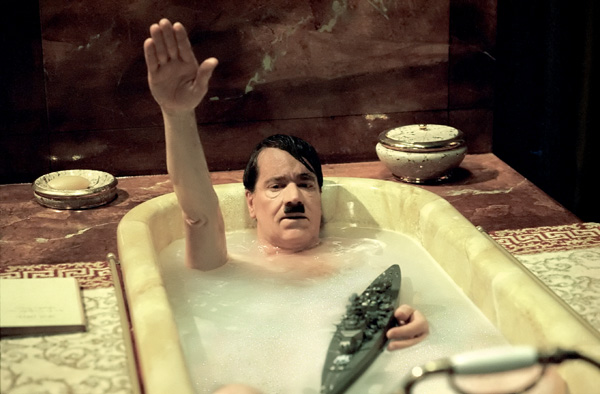|
Reviews of Recent Independent, Foreign, & Documentary Films in Theaters and DVD/Home Video

MY FÜHRER: THE TRULY TRUEST TRUTH ABOUT ADOLF HITLER For American audiences, it’s been decades since Charlie Chaplin’s The Great Dictator, Mel Brooks’s The Producers, and TV’s Hogan’s Heroes made fun of Nazis. Now, director Dani Levy makes the Third Reich safe for satire for German audiences with My Führer: The Truly Truest Truth About Adolf Hitler. Over familiar newsreels of Hitler riding through a cheering Berlin, the opening, cynical narration hints that the film will target mass hysteria as the source of the Nazis’ rise. Until, that is, propagandist par excellence Joseph Goebbels (Sylvester Groth), architect Albert Speer (Stefan Kurt), and SS head Heinrich Himmler (Ulrich Noethen) scheme like buffoons in the ornate Reich Chancellery. Those ostentatiously endless Nazi military titles have long been a staple of English-language satire, so this comedy can salve one’s curiosity of whether the Germans think they sound funny too. Let alone the endless raised arm salutes and underlings forgetting to address Hitler himself with “Heil Führer” instead of the ubiquitous “Heil Hitler.” As the war nears its end, Goebbels has hit on a plan to rekindle Hitler’s fire in his belly and inspire the people’s perseverance to turn the war around—with a New Year’s speech in a bombed-out Berlin that will be transformed as a Potemkin village for the cameras. But Hitler (Helge Schneider) has become so depressed and paranoid that the only person he would trust to bring him back to his former oratorical heights would be his former drama teacher, Adolf Grünbaum, a Jew toiling in the Sachsenhausen concentration camp. Goebbels figures this will kill two birds with one stone—help Hitler with his elocution and stoke his anti-Semitism. Ulrich Mühe invests the professor with so much dignity and moral authority that he makes this character in a ridiculous situation convincing. Despite the absurdity around him, he is the emotional core of the film (as he was as the surveillance agent in The Lives of Others). Grünbaum gathers the courage to make demands, starting by insisting that his wife and children join him in Berlin. (That they are even still alive is suavely explained by Goebbels; they were at the model Theresienstadt camp). Grünbaum’s family proves to be tougher negotiators than the Nazis’ top officials. Grünbaum’s rebellious teen son constantly needles his father for not trying to kill Hitler, and his wife even tries to do the deed herself (after she sings the Führer to sleep with a Yiddish lullaby). The acting professor puts Hitler on the Freudian couch to help him get in touch with his inner hatred, and all the revelations about abuse and neglect from his father pour out. By this time, the movie already feels like a Saturday Night Live sketch that’s gone on too long before it gets to its Singin’ in the Rain-like climax.
Levy
doesn’t gloss
over the blood and bodies that underpinned the dawn of 1945, in the
camps and for German civilians, as the war dragged on even after it was
clear the thousand-year Reich was only going to last 12 years, as
Grünbaum notes. So
no wonder Go for Zucker!,
Levy’s satire of German reunification,
was sillier and funnier, even to non-Germans.
Mostly of anthropological
interest, My Führer is like a curio exhibit in a Museum of German
Comedy rather than a very amusing or profound entertainment for
international audiences.
Nora Lee Mandel
|

